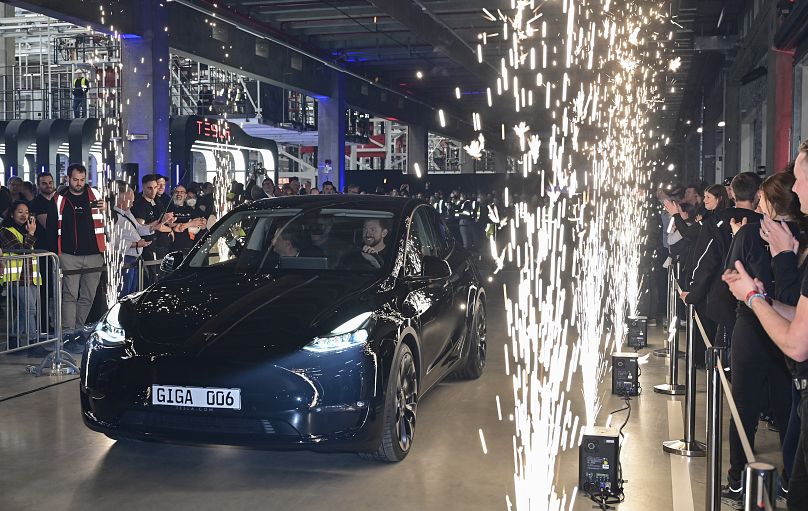Tesla is currently Europe’s second largest EV manufacturer, behind German carmaker Volkswagen.
Electric car manufacturer Tesla opened its first European factory on the outskirts of Berlin on Tuesday, complementing its other manufacturing bases in the United States and China.
“Danke Deutschland!” tweeted the company’s CEO Elon Musk, who attended the plant’s opening ceremony alongside German Chancellor Olaf Scholz and Economy Minister Robert Habeck.
“This is a great day for the factory,” Musk said, describing it as “another step in the direction of a sustainable future”.
1/1
Skip Ad
Continue watching
after the ad
Visit Advertiser websiteGO TO PAGE
PLAY

Latest
Video Settings
Full Screen
About Connatix
V452730

Read More

Read More

Read More

Read More

Read More

Read More

Read More

Read More
The long battle over Russia’s frozen assetsheats up
 (new Image()).src = ‘https://capi.connatix.com/tr/si?token=604675c4-ea89-46c9-9817-5ed115e7bf41&cid=83b16131-8326-440c-9a78-470bcd2870e2’; cnxps.cmd.push(function () { cnxps({ playerId: “604675c4-ea89-46c9-9817-5ed115e7bf41” }).render(“29572e93412441b3b0dc992bd9167d8a”); });
(new Image()).src = ‘https://capi.connatix.com/tr/si?token=604675c4-ea89-46c9-9817-5ed115e7bf41&cid=83b16131-8326-440c-9a78-470bcd2870e2’; cnxps.cmd.push(function () { cnxps({ playerId: “604675c4-ea89-46c9-9817-5ed115e7bf41” }).render(“29572e93412441b3b0dc992bd9167d8a”); });
The company says the new “Gigafactory” in Gruenheide, around 30km from Berlin, will eventually employ 12,000 people, around 3,500 of whom have already been hired.
German Green Party politician Habeck said the opening of the factory was “a nice symbol” showing that petrol and diesel-powered cars could be replaced with electric vehicles at a time when Germany and other nations are trying to reduce their greenhouse gas emissions and wean themselves off Russian oil.
Europe’s hot EV market
At full capacity, Tesla’s new plant will produce 500,000 cars annually – more than the 450,000 battery-electric vehicles that German rival Volkswagen sold globally in 2021.
Volkswagen is currently the biggest player in Europe’s electric vehicle market, with a 25 per cent market share to Tesla’s 13 per cent. Musk has said ramping up production will take longer than the two years it took to build the plant.
Financial analysts JPMorgan have predicted that the Gruenheide Gigafactory could produce around 54,000 cars in 2022, increasing to 280,000 in 2023 and 500,000 by 2025.
Volkswagen, which has already received 95,000 EV orders in Europe this year, is planning a new 2 billion euro EV plant alongside its Wolfsburg factory and six battery plants across Europe.
But its timeline lags behind Tesla’s, with the EV factory to open in 2026 and the first battery plant in 2023.
Later than planned
Tuesday’s opening came some eight months later than originally planned, as Tesla faced regulatory obstacles over water supply and air pollution control.
The company originally began building the vast facility less than three years ago, before it received official permits to do so. Had those permits not been issued, the company would have had to level the site.
“That’s a different company risk culture,” Habeck said, after being asked to compare Tesla’s approach with the slow pace of German construction projects — such as Berlin’s nearby new airport, which opened with a nine-year delay.
Environmental campaigners have warned that the factory could affect drinking water supplies in the region.
Tesla has dismissed those warnings. The company refused most media access to the site and the ceremony on Tuesday.















